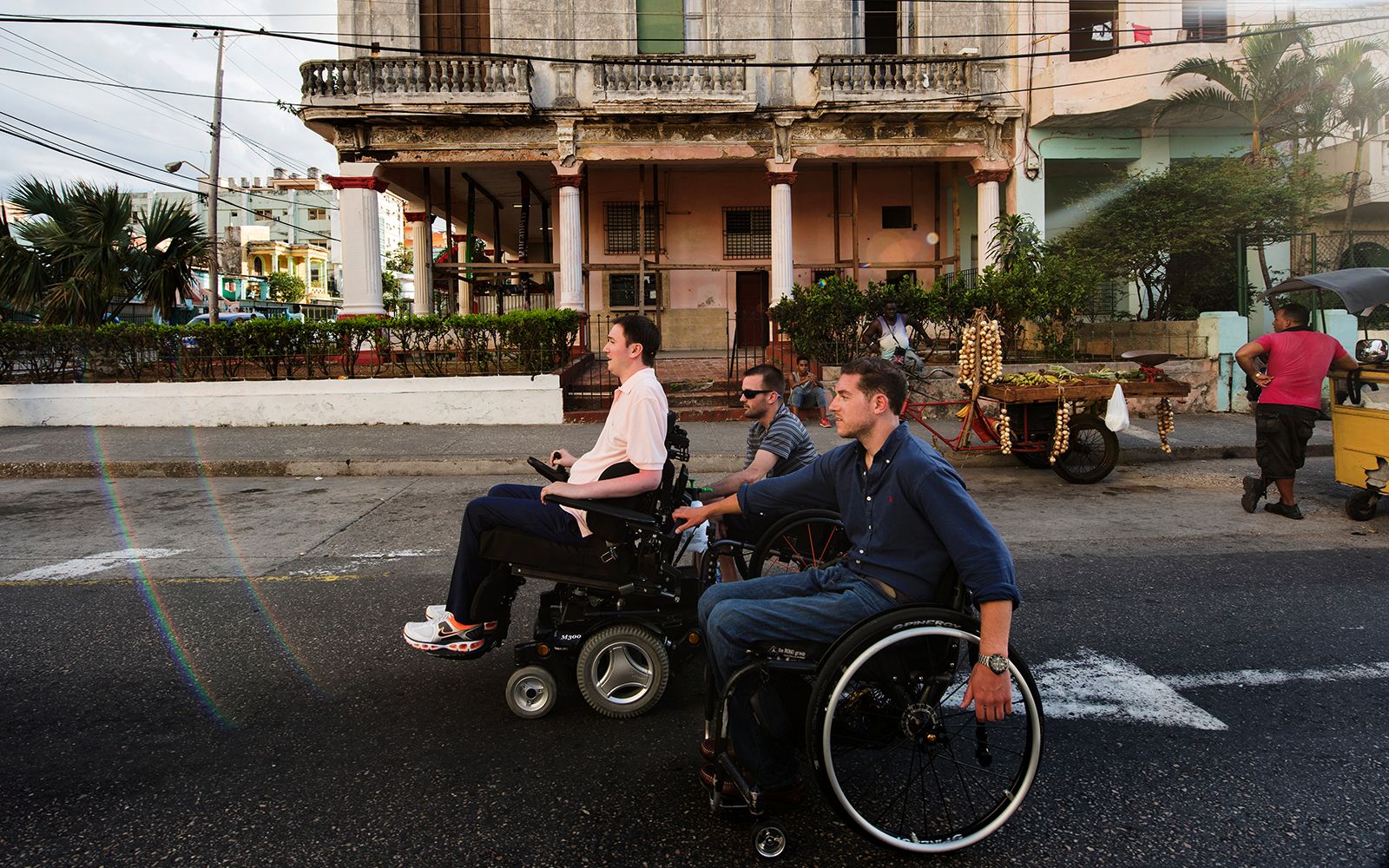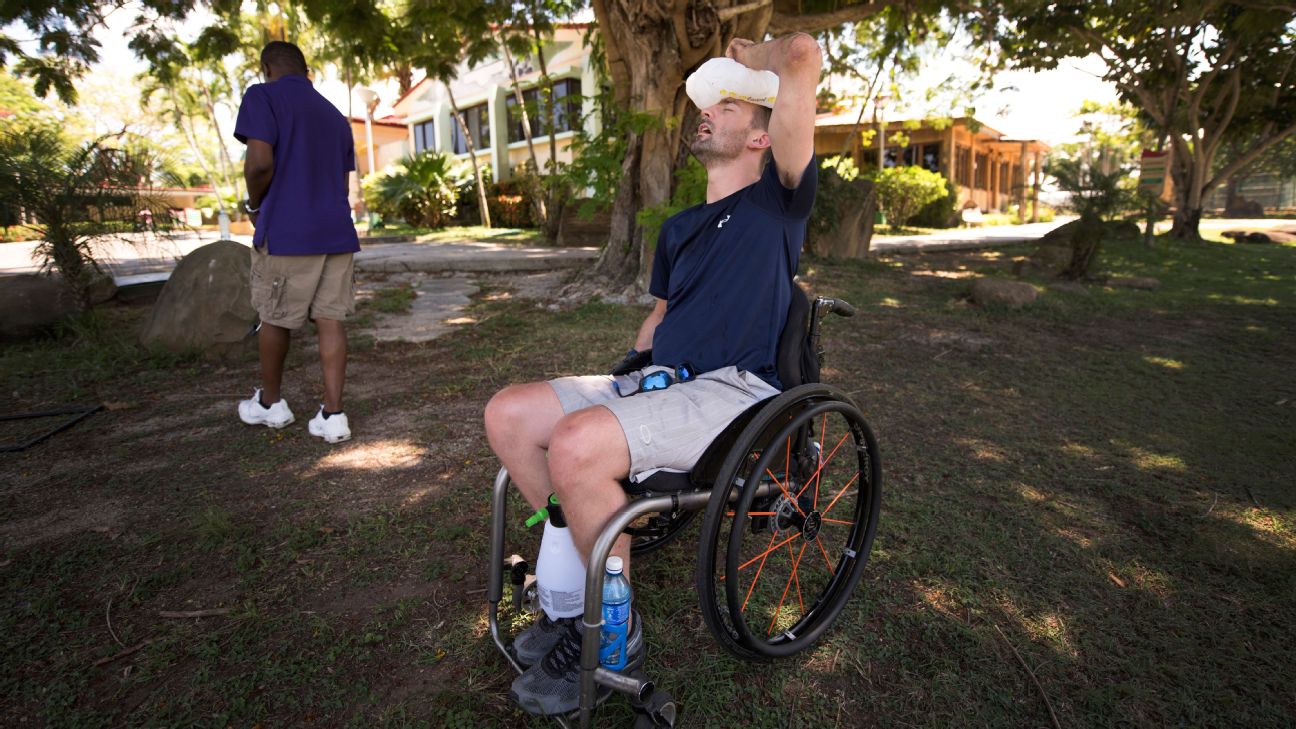
Navigating Cuba
What would it take for Josh Basile to sail to Cuba, explore its cobblestone streets and survive the heat in a wheelchair?
Josh Basile was going to visit that goddamn cigar factory.
In the dozen years since a wave knocked him to the ocean floor and cracked his C-4 and C-5 vertebrae, leaving him quadriplegic, Basile, 31, has learned how to make things happen for himself. It took awhile to find the blend of resolve, creativity and patience he needed to move forward. But Josh found it. So there was no question: He was going to visit that factory.
By the time he got to Havana earlier this spring, Josh had gone through extensive rehab, regaining and then losing some use of his hands. He graduated from college, then law school. He started a nonprofit, Determined2Heal, and SPINALpedia, an online community for people with spinal injuries.
He found meaning in sports. Before his accident, Josh was an avid golfer and a collegiate tennis player. After it, he began to try activities such as gliding and indoor skydiving. He invented an adaptive version of golf, slingshot golf, that he would bring with him to Cuba.
After his accident, sports gave Josh a way to simply feel like Josh -- to lose himself in the competition and find in himself skills that would transcend it. The trip to Cuba was not in itself necessarily a sports trip -- but sports were part of the journey to the journey. They made it possible in the first place. They made it so that Josh had the experience and wherewithal to wrangle a 60-foot wheelchair-accessible catamaran to sail him and a few friends -- two of them also in wheelchairs, also athletes -- across the Straits of Florida from Key West to Cuba.
Why Cuba? Because why not. Because it seemed preposterous. The idea actually started out as a joke between Josh and the captain of the Impossible Dream, whom he had met the previous year.
Why Cuba? Because it was as far outside of his comfort zone as he could imagine. And if he was going to go to Cuba in a 450-pound power wheelchair, he wanted to do it right.
In the context of all that, going into a building and watching a few cigars get rolled might not seem so hard. But that's another thing you have to get used to after a spinal cord injury: Some things -- and not just frivolous-seeming things like cigar factory tours -- take longer than they used to.
Touring the factory wasn't a problem. It had a functioning elevator. The problem was getting into the building in the first place: To reach the elevator, you had to surmount five very steep steps.
Josh was prepared for this. Josh is prepared for everything. When you're quadriplegic, you learn how to anticipate -- no way around it. Josh brought portable ramps with him to Cuba that allowed him to steer his power chair up and down curbs and short stairwells. But this time, the ramp wasn't enough. If he tried to accelerate up the ramp, his chair would tip backward.

Even if it isn't always pretty, Basile wanted to show that a person with a spinal cord injury could navigate Cuba and do things such as visit a cigar factory. Carol Guzy for ESPN
As Josh sat at the bottom of the steps and talked through the situation with his caregiver, Kingsley, a crowd began to gather around him. Attention is another thing you get used to when you live life in a wheelchair. Cab drivers and off-duty factory employees and passersby shouted out suggestions in Spanish as Kingsley arranged and rearranged the ramp. After about 15 minutes, the crowd took matters into its own hands. This was the unexpected thing. The people weren't gawking; they were helping. Josh, Kingsley and a few of the passersby arrived at an unspoken plan. Josh steered himself to the foot of the ramp. With his right hand, which has limited use, he pushed his joystick forward. As the wheels of his chair began to spin, behind him, the group of strangers pushed Josh in his 450-pound chair up the ramp and into the factory.
This was exactly why Josh had come to Cuba -- exactly why he raised money for the trip from sponsors such as the Kennedy Krieger Institute, the spinal cord injury rehab center in Baltimore where he underwent therapy. Because even if it isn't always pretty, and even if it isn't always efficient -- it's never efficient -- he wanted to demonstrate that a person who had suffered a spinal cord injury could go to Cuba and could go to the goddamn cigar factory.
"I never really saw it as a vacation," Josh said after the trip. Josh is not a person who is predisposed to relaxing.
A spinal cord injury is catastrophic -- "devastating," said Colin Buchanan, one of Josh's traveling companions -- but that doesn't make it an ending. Buchanan is paraplegic, which means he still has full use of his arms and hands. He broke his back in high school in the Seattle suburbs when a friend sped a car he was riding in into a ravine. He's 27. He says one thing you must come to terms with after a spinal cord injury is that you will need to learn how to accept help from strangers.
"I would have never been in Cuba, would never have met Josh, I would never have done marathons, I wouldn't have played wheelchair rugby," said Robby Beckman, who broke his neck in college diving off a dock with some friends. Beckman, 32, is quadriplegic but still has some use of his arms and hands. He plays quad rugby -- the sport popularized in the documentary "Murderball" -- and races in marathons on a hand cycle.
Josh, Colin and Robby have learned how to live with their injuries, but getting to that point takes a lot: a strong personal support system and quality care from health care professionals. It takes time, patience and an immeasurable deep reservoir of determination. You learn how to ask for help. You recalibrate your relationship with your body.
Then, once you start living, you need stuff. A lot of it. The logistics of life with a spinal cord injury are unforgiving in their demand for stuff. "Clothes," said Colin, who once backpacked solo in Europe, "are the last thing I think about when I'm packing for a trip."
So say you've suffered a spinal cord injury and want to sail from Key West to Cuba, tour Havana for four days, then sail back. It's going to be 90 degrees out, and your Spanish is limited. You've never sailed in a wheelchair. The cobblestone streets under your wheels will make you have to pee constantly. Preparation is necessary for any trip -- but when your body can't regulate sweat below the point of your injury, when you depend on that wheelchair bumping over the cobblestones as your sole means of transportation, when having to pee means having to find a place to change your catheter -- preparation takes on a hell of a lot more significance. It's not just packing anymore. You'll need ...
Carol Guzy for ESPN
A boat
You can't set sail without a vessel. Last year Josh was introduced to William Rey, captain of the Impossible Dream, a 60-foot, wheelchair-accessible catamaran based in Miami. The boat -- there was some debate as to whether one could call it a yacht -- has decks wide enough for a wheelchair to pass all the way around its cabin. Both hulls have lifts hidden in the floor to take wheelchair passengers down to their cabins. In 2015, former President George H.W. Bush went for a spin on board.
This time, the manifest included Josh; his girlfriend, Gabrielle Ahrens; Colin; Robby; Kingsley; and Bruce -- who had been Josh's and Robby's physical therapist at the MedStar National Rehabilitation Hospital in Washington, D.C. Bruce was along to help with tasks such as transitions: getting from a wheelchair into a bed or the passenger seat of a car or wherever else a person might need to go.
For instance, from a wheelchair onto the front netting of a catamaran, where Josh, Robby and Colin lay sprawled out as the sun set slowly over the water, and Key West faded into the horizon behind them. Captain Will and his first mate, Evan Duffy, ran through safety procedures with his passengers: No drinking once the boat is underway. Stay off the front of the deck at night unless you're willing to put on a life jacket. And -- seriously -- keep an eye out for rafters. Robby and Bruce both signed up for watches, and both slept through them. The weather was so calm that, soon after setting off Sunday night, Captain Will had to turn on the engines.
By late morning on Monday, the Impossible Dream was docked at the Hemingway Marina, where a fishing rod allegedly once used by Fidel Castro hangs in the yacht club and old Canadians and Europeans with boats sit around all day drinking Cristal beer.

Josh Basile is determined to not let his paralysis stop him from experiencing the world. This determination led him and two of his friends, both with spinal cord injuries, on a sailing adventure to Cuba.Carol Guzy for ESPN
Spray bottles
It was hot in Cuba -- even for Cuba. Ninety every day. Relentless sun and a cloudless sky. While that might be nothing more than an inconvenience for an able-bodied tourist, it presents a tougher challenge if you're paraplegic or quadriplegic. One of the many functions diminished below the point of a spinal cord injury is thermoregulation: Your body can't maintain its temperature. And not only that, you can't feel the heat or cold below the point of your injury. You don't know your legs are too hot because you can't feel your legs.
Which is why it took little time for Josh to develop a sunburn on his left arm that seemed to changed colors like a mood ring throughout the trip. But he couldn't feel it.
To keep cool, you need to take additional measures. Robby bought a couple of big pump-and-spray bottles at Home Depot on Key West before the sail. He and Josh would hang them on their chairs as they rolled around Havana. That's one more thing: Spinal cord injuries mess with sweat glands too, especially below the point of the injury. Sometimes that means you need a cold compress or bags of ice -- or pointing a spray bottle at your face.
"They saved me," Josh said. They were especially useful on the golf course, where the boys played slingshot golf -- an adaptive game Josh invented and has patented, involving slingshots and a pendulum-powered putter. They were also, it turned out, useful for spraying at cars carrying your friends as they sped alongside you down the malecón in Havana.

Hotels are for old people and dignitaries in Cuba, so Josh and his friends stayed with a host family. Carol Guzy for ESPN
Shelter
Hotels in Havana are for dignitaries and old people. Keyed-in travelers opt for a casa particular -- a rented room in somebody's home. The food is better, and so is the hospitality. The casa particular where Josh & Co. stayed happened to be owned by another person with a spinal cord injury -- Camilo Martinez Finlay, and his girlfriend, Teresa. Camilo was paralyzed in 2000 after a car accident. He's a warm, bullet-shaped man who wears purple pants and a big smile. He doesn't speak much English but likes to say, "Don't worry. Be happy."
There's a ramp to the colonial house from the sidewalk, and there is a makeshift winch-operated elevator on the outside of the building to get up to the rooftop bar that Camilo and Teresa also run. It's called Encuentro -- Encounter -- as in every ride on the elevator feels like a close encounter with death. Camilo and Teresa's house also has the only wheelchair-accessible bathrooms anybody in the group will see during the trip.
Carol Guzy for ESPN
Straps
On their first day in Havana, Josh, Colin, Robby and Gabby piled into a hot pink classic Chevy convertible to catch a tour of the city. Josh sat in front because the transfer was easier from his power chair to the front seat. Gabby took the middle seat in the back because it was easier for her to climb in, and Colin and Robby flanked her. Their driver was about to zoom away from Camilo and Teresa's through Vedado to the Plaza de la Revolución, when Josh noticed that there was no seat belt in the front seat. "1952 Chevy," their driver said in English. "No seat belts." This wouldn't normally be a problem for a traveler unless he or she were particularly risk-averse. Josh isn't, but due to his injury he also lacked the necessary trunk control to hold up his body in a swerving and braking and generally moving vehicle without a seat belt.
The solution? Kingsley and Bruce wrapped a pair of cotton quick-release straps around Josh and then the seat behind him, anchoring him to the seat. They usually come in handy for transfers; they give Kingsley something to grab on to when he's helping Josh move from one place to another. The group took off past the Plaza, snaked along the Almendares River and sped down the wide Avenida 5 in Miramar past mansions and embassies. Then the engine blew out, and the driver pulled into a hotel and popped the hood. They made it back to their casa particular, but not as quickly as they'd departed.

Simply trying to enter or exit the city's older buildings was a challenge. Carol Guzy for ESPN
Catheters
The wheelchair is the most visible aspect of life after a spinal cord injury -- but it's not necessarily the most life-changing aspect. That's what Josh and Colin and Robby keep reminding me. "This isn't a broken leg or a sprained ankle," Robby said. "This is life changing. A lot of people don't want to accept that because it's hard."
Life changing means you lose more than just the ability to walk, or use of your hands and arms. It means you lose bowel and bladder function. That means, if you plan to get out of the house and go to work, or out of your room and go see Cuba without the possibility of a mess, you need to go through your manual bowel program in the mornings.
That also means inserting a catheter every time you need to pee -- or, in Josh's case, managing a suprapubic tube, a catheter that's permanently inserted into a small hole under the belly.
Robby actually ran out of catheters the day before the group left Cuba and had to borrow a handful from Colin, who brought about a hundred with him on the trip. In addition to the hundred regular catheters, Colin also brought a handful of Foley catheters, which can be left in for long periods (up to two weeks) and a prescription bottle of Ciprofloxacin, an antibiotic used to treat urinary tract infections.
"I actually packed an extra day and a half worth of catheters and ran out," Robby said. "That was one thing I didn't account for -- the amount of water I was going to drink in the climate down there. We were drinking water and everything else at a rapid rate."

Dancer Joana Menendez takes the opportunity to dance with Josh and his friends at their table during the final musical number of the night. Carol Guzy for ESPN
A fixer
The drinking of water -- and everything else -- at a rapid rate began that first night in Havana, at the Tropicana, Cuba's iconic nightclub and cabaret. Back before the revolution, this was where Nat King Cole and Josephine Baker played. It was famous for its lavish midcentury architecture, for its scantily clad showgirls and for its not-so-secret mob ties.
Soon after the group rolled in at the close of the opening number, there was enough Havana Club rum on the table to keep them all soaked up for the next week. Robby kept the glasses full -- except Colin's because he wasn't drinking on the trip. The Tropicana is an intimate spot, letting in the night air humid and heavy with cigar smoke. The table, toward the back of the club, was up against the aisle. Before each number, a line of girls in fishnets and big hats with chandeliers and fruit platters and just about anything else you could imagine stood beside them, getting ready to take the stage.
During the final number, one of the showgirls stuck around the aisle to dance with Josh and Colin and Robby. Meanwhile, members of the audience, including Gabby, were called up to the stage. A frat boy from Kansas did the Carlton dance.
Afterward, the group's fixer, Jorge Gutierrez, went to track down the dancer. Jorge was born and raised in Cuba but left a dozen years ago. These days, he works as the fleet manager at Shake-A-Leg, a marina in Miami with a focus on accessible sailing experiences. That's how he got hooked up with Josh and the Impossible Dream.
Every logistical detail in Cuba was Jorge's responsibility: He arranged the stay at Camilo and Teresa's, bought the tickets at the door of the Tropicana, organized transportation on the island. He understood the unique needs of a bunch of tourists in wheelchairs. More important, he also understood how to get things done in Cuba.
The dancer's name was Joana Menendez. She'd been at the Tropicana for a year and a half; she had worked her way there through a series of Cuban dance academies. This wasn't the first time she'd danced with the audience, she said. But it was the first time she'd danced with people in wheelchairs. She took pictures with Josh and Colin and Robby before they rolled out the door with unfinished bottles of rum in their backpacks.
Carol Guzy for ESPN
A mirror (and somebody to hold it)
Technically not necessary, but Josh, who is very particular about his hair, might disagree. When you're quadriplegic, and especially if you are a high-level quadriplegic like Josh, you learn to become very specific when giving instructions. One of the first things they teach you in therapy, Josh said, was to be your own best caregiver. That means knowing what you need and how to ensure that you get it.
That could mean pointing someone to redirect a car air-conditioning vent juuust a little bit, wait, no, too far. It could mean describing how much hairspray to use, or how far from your face you need someone to hold up a mirror afterward. By now, many of those things are unspoken between Josh and Kingsley. But this was different. He was preparing to propose to Gabby, and Josh fell back on, well, being ultra-specific.
Before the proposal -- an elaborate affair involving a ruse, a sketch artist and Josh sitting atop the deck of the Impossible Dream holding a sign that read "Will you marry me?" -- he sat in the cabin of the boat with Kingsley. Josh could certainly still sweat above the point of his injury, and he repeatedly asked Kingsley to dab his face, then to hold up the mirror, like he was worried that, in the last second before proposing, he would sprout a pimple or his hair would turn gray.
He had written down a couple of lines to say to Gabrielle, and he recited them over and over while he waited for her to arrive. When someone pointed out that he sounded like Luca Brasi in "The Godfather" before he meets Don Corleone, Josh grinned and said he hoped he didn't meet the same fate as Brasi, who eventually slept with the fishes.
Josh didn't -- she said yes. In Gabrielle, he found somebody who loved him and understood his needs. (Another milestone on the trip: Gabrielle performed her first solo transfer of Josh from his chair into a bed.) But also somebody who saw him as her boyfriend, as opposed to her quadriplegic boyfriend.
"The problem that I have with using the word 'inspiration' whenever you are speaking in terms of a handicap person is that I think it's extremely patronizing," she said later on the trip. "Josh is a lawyer, and I think that's an accomplishment in and of itself. People call him an inspiration because he's in a wheelchair. No, Josh is an inspiration because he's smart, because he worked his ass off. I don't think you should link the two together."
Pills
"Inspiration" might not be the right word, but Josh does want to motivate people. He wants to inform people too. The point of the Cuba trip, after all, wasn't just to take a vacation. He was out to prove a point.
Josh has been putting on what he calls "rehabilitative adventures" for years through his nonprofit Determined2Heal. Each journey is meant to serve the people who travel with him but also as proof that such adventures are possible.
One thing that prevents people with spinal cord injuries from getting out is the fear of disrupting their routines. The routine is everything. It's that morning process of bowel program, catheter, shower, toothbrush, clothes, stretching, pills, more pills. Josh takes pills by the handful. Stool softeners, antidepressants, B complex vitamins, multivitamins, fish oil, Adderall, Urex.
The routine helps physically and mentally, he says. It's unique for everybody, specific and rhythmic. "Because you do it every day, you don't think about why you're doing it."
Breaking that routine to do things like going to Cuba means exposing yourself to risks -- like the airline loses your suitcase with catheters in it. It also means confronting the reasons your routine exists in the first place.
Carol Guzy for ESPN
Allen wrenches
The thing about living in a wheelchair is that you are always dependent on a machine. For Robby and Colin, that's a relatively simple manual chair. For Josh, it's an elaborate battery-powered chair.
Everything about the chair matters. First there's comfort: size, height of the backrest, dump (that's the angle of the seat), cushion. Then there are questions of function: How are the casters working? The brakes? The wheels?
In places like Old Havana, rolling over cobblestones could lead to involuntary spasms -- another everyday consequence of spinal cord injuries -- which makes getting a relatively smooth ride even more important. Colin and Robby both carry Allen wrenches and other lightweight tools to keep their chairs in decent running order.
But in Cuba, they also recognized that they were starting from a very privileged place compared to the paralyzed people they encountered. One afternoon, on Calle Obispo, a narrow pedestrian street lined with tourist shops and restaurants, Robby and Colin encountered an old man slumped in a broken-down wheelchair. He held a cup with some change in it but wasn't really begging. Robby and the old man stared at each other in silence for a moment. The old man had cataracts in one eye. He admired Robby's and Colin's chairs, and they studied all the ways his was battered. New wheelchairs are scarce in Cuba, and old ones are maintained the same way old cars are, which is to say very creatively.
The old man said his name was Maximo Rigoberto Acosta Olivera. He said he had been injured in a work accident many years before. He wanted to tell them that the best way to care for their bodies was to cover themselves with crushed garlic. Head to toe. When Colin handed him a $20 bill, he broke out in tears.
He cried and said, "Salaam alaikum," or Peace unto you.

Robby Beckman launches himself off the catamaran for a swim off Key West. Carol Guzy for ESPN
And an ambulance
In the United States, spinal cord injuries are expensive. Medical care is expensive. Rehab is expensive. Ongoing physical therapy is expensive. Wheelchairs themselves cost thousands of dollars.
If your injury is high level, like Josh's, you might need to pay for caregivers. Even if it isn't, you might have to move someplace wheelchair accessible -- or, if you can afford to do so, install ramps or elevators where you already live. There are resources out there to help -- government programs, for example -- but actually tapping into those programs can be a challenge for people in the communities who need them most.
It can feel as if the world is telling you to stay home, stay inside. In that sense, Robby, Colin and Josh would all tell you that they are lucky. They have families who support them. They are able to live good lives and have careers.
Of course, it's all relative. And of course you'd rather not have a spinal cord injury. Robby said one night, jokingly, but also not jokingly, that he'd really just settle for the ability to pee normally. But he also said that, compared to being paralyzed in Cuba, he thinks he has it pretty good. Here in the U.S., there's the Americans with Disabilities Act. Robby has a state-of-the-art chair. He has a pickup truck with hand controls and an off-road vehicle with hand controls.
And in Cuba, he and Colin and Josh had an ambulance. Jorge's crowning achievement as the guys' fixer was finding it the day before they arrived at a rehabilitation center on the outskirts of Havana. The ambulance solved the logistical problem presented by trying to stuff three paralyzed dudes and three wheelchairs (one of which is large and not collapsible) into a minivan.
When it was time to go to the Tropicana, or to the artisanal market in Old Havana, or anywhere else, Josh, Colin and Robby could just load into the ambulance with its wheelchair liftgate, turn on their brakes and take off. There was something funny about a bunch of tourists cruising around Havana in an ambulance, but there was also something fitting about it.
After the cigar factory tour, Josh found himself once again facing those five steps between him and where he needed to be. But this time, he was smiling because the factory had been everything he'd hoped: rows and rows of long tables, the smell of tobacco and loud, scripted tidbits from the tour guide. Hip-hop and salsa music over speakers. Workers sold unlabeled cigars under the table at four for $20.
Some of the same cab drivers who had helped Josh into the factory thought they could get him out in much the same way, just in reverse: lowering him slowly down the ramp backward to the sidewalk. But before Kingsley could lay down the ramp, the ambulance began to slowly turn around in the narrow street.
Little by little, the driver eased the ambulance so that its back tires were up against the curb. He raised the liftgate as high as it could go -- flush with the back of the ambulance, and then extended it out beyond the top step. It turned out that Josh could just roll right onto the liftgate, which he did, and then into the back of the ambulance.
The ambulance took him back to Camilo and Teresa's, and after that back to the Hemingway Marina, where the Impossible Dream was waiting.







